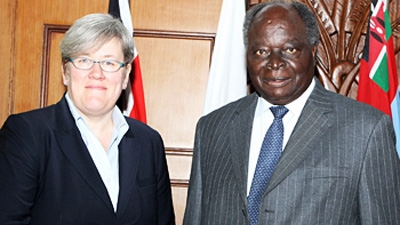Rachel Kyte, World Bank Vice President for Sustainable Development wrapped up a visit to Africa last weekend encouraged by actions and opportunities for sustainable growth.
In Nairobi, Kyte, held a town hall at the World Agroforestry Centre with staff from the various Consultative Group on International Agricultural Research (CGIAR) centers. Kyte, who serves as the chair of the CGIAR Fund Council, emphasized the importance of climate-smart agriculture and of taking a landscape rather than piecemeal approach to agricultural research for development. || Rachel Kyte, Vice President, Sustainable Development, The World Bank.
Speaking from Nairobi on the last leg of a three-nation tour that also took in Rwanda and Burundi, Kyte said Kenya has the opportunity to achieve higher, more sustainable growth if it increases investments in infrastructure and climate resilient development.
“This is an important year for Kenya and we trust that the momentum of growth and reform will be maintained,” said Kyte. “My sense from this visit is that there are abundant opportunities to transform Kenya by good execution of plans for infrastructure, including energy, transport and water. Kenya’s transformation is also key to regional integration,” she said.
Kyte said more efficient transport systems, green energy investments, and actions on adaptation to climate change will increase Kenya’s competitiveness in the East African region and provide safer livelihoods for millions of Kenyans.
In talks with President Mwai Kibaki, Kyte reaffirmed the Bank’s commitment to assist Kenya meet its critical challenges, including providing additional resources of about US$1.5 billion to bridge investment deficits in the water, energy and transport sectors.
Praising Rwanda’s development success
Rwanda was the first stop on the Bank Vice President’s schedule. In Kigali, she commended the government’s vision and commitment for implementing successful growth-driving policies.
“Rwanda has been a great development success story over the last decade,” she said. “Now, as Rwanda builds on that success, making the transition from aid to more investment, we stand ready to support this transformation.”
In meetings with the Prime Minister, she highlighted the need for the government to continue enhancing Foreign Direct Investment, facilitate public-private partnerships to maximize opportunities from existing growth sectors, and to focus public expenditure on the key bottlenecks for economic growth especially transport and energy.
She also emphasized that with infrastructure investments that are efficient, realistic, and sustainable, Rwanda will achieve its medium-term growth targets.
Kyte also met with representatives of the private sector and the donor community, and visited World Bank-funded projects.
Transforming the Rwanda landscape
On a field trip to Gatsibo District, Kyte was impressed by how Bank supported agricultural projects had helped to transform a once barren landscape for the better.
“I looked down on terraces of maize, compost puts, bushes and trees holding the soil in place and providing forage,” she said. “It was the richest, most luscious of landscapes. It was a transformation.”
“As Rwanda struggles to make the transition from aid dependence to investment and private sector led growth, it was the pride and confidence of the communities and their leaders that was the most impressive.”
Reaffirming support to Burundi
During her visit to Burundi, Kyte reaffirmed the Bank’s commitment to help the government to implement its poverty reduction strategy.
“I congratulate the Government for its commitment to reform and its new strategy,” said Kyte, after meeting with Burundi President, Pierre Nkurunziza.
“There remain huge challenges ahead to allow Burundian access to energy, finance and markets,” Kyte continued. “We urge our development partners and the investment community to recognize Burundi’s progress and the opportunities it offers.”
During her visit, Kyte discussed Burundi’s development priorities and how regional integration, especially in the East African Community, may shape the future growth of the country. She also held meetings with development partners, civil society, and private sector representatives.
While visiting Bank-financed projects in Bubanza, Kyte stressed the importance of investing in women and assuring their equality.

